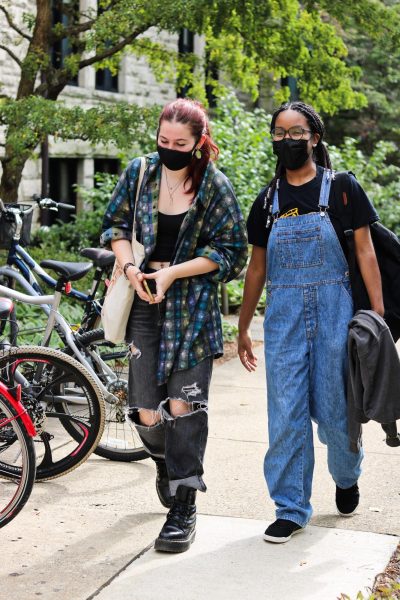Why Everyone Should Meet With an Executive Functioning Tutor
With the sun beaming down on Ohio’s flat landscape and in-person events ramping up, everyone wants to enjoy the summer weather to the fullest. Unfortunately for students, it’s also midterms, and we have to set aside time to work. Luckily, Oberlin College offers the Executive Functioning Program, which provides students with tutors to help with things like time management, breaking down assignments, or reaching out to professors for help.
Even without the temptations of summer, managing schedules in college is difficult. Coming from high school, where our time was planned for us down to the minute, college life is a huge switch. We spend less time in class, leaving us hours of unstructured time to spend how we want. There is pressure to get work done, spend time with friends, take on extracurriculars, find a job, or just do our own laundry. A year ago, I was itching to escape the rigidity of high school. But now the pure freedom is overwhelming. Sometimes, with a massive to-do list and no idea how to start, absolutely nothing gets done.
The EF tutoring program is designed to help students better navigate these aspects of college life. College second-year Saint Franqui, a tutor for the past two years, describes his job as helping students with, “for lack of a better word, adulting skills — everything that it is to be a person on your own.” We are expected to come to college knowing basic skills on living alone and scheduling our own time. In reality, this is a skill that requires practice, trial-and-error, and assistance from more experienced peers.
Students can meet with an EF tutor at their convenience, with no long-term commitment. A tutoring session can be a one-time meeting, or it can be a recurring check-in. The focus of every meeting is up to the student. Some students want a hands-on session to break down an assignment and schedule work chunks. Others may prefer a more laid-back meeting. One tutor, College third-year Aniella Day, notes that she has had “some students set up appointments just to sit with me while they do their work so I can keep them accountable.” Sometimes, getting academic help can be as simple as having a study buddy.
When I first heard about this program, I was surprised. I felt that at college, we were on our own: viewed as adults and responsible for figuring out our own schedules. We will always have to deal with transitions in life — changing jobs, moving — and we will have to adjust as best we can. College is the time to build these life skills. But we don’t need to do it alone.
It makes sense that we have to figure out for ourselves what works best. But why is it considered bad when we need a boost? Many of us had limited chances to practice executive functioning in high school. It’s unfair to expect us to have all of these skills when we first arrive on campus. It’s also even harder to develop these adulting skills in an environment where we are expected to already have them. Apparently, paying an expensive tuition bill and moving away from home is supposed to make us instantly ready to live on our own.
The do-it-yourself mindset is founded in the societal view that needing help is humiliating. Franqui noted that it’s often difficult to get students to sign up for appointments in the first place, or even if students do sign up, it’s difficult to ensure that they actually show up for their meeting.
Everyone has struggled though, including the EF tutors. Day often draws from her own academic and personal struggles to “connect with students [and] show them that you can have these problems, but also build yourself up and get out of that place.” College second-year Aishwarya Krishnaswamy, a new tutor this summer, relied heavily on the program her first year at Oberlin. Krishnaswamy felt there was no one to guide her in her first year, and the EF tutoring program saved her. “I don’t know what I would have done without this in the first year,” she said. Even Franqui, who felt he had strong executive functioning skills coming into college, still occasionally meets with another EF tutor for a quick check-in. These tutors have struggled with executive functioning skills the same way we do. The only difference is they have been trained in strategies to manage life and are eager to share with us.
Most Obies I’ve met are overachievers — overbooking themselves to accomplish more things academically, try new hobbies, and have more “Oberlin” experiences. Franqui notices this frequent problem, acknowledging that often, “the student does not have the time in the schedule; they’re over committed, which is very common at Oberlin.” What is incredible about Oberlin’s atmosphere is that it’s not competitive or judgmental. Our peers are eager to provide support, which is why the executive functioning program exists. We should take advantage of this program to cement these functional skills before we graduate and no longer have eager peers readily available at the push of a schedule button.




